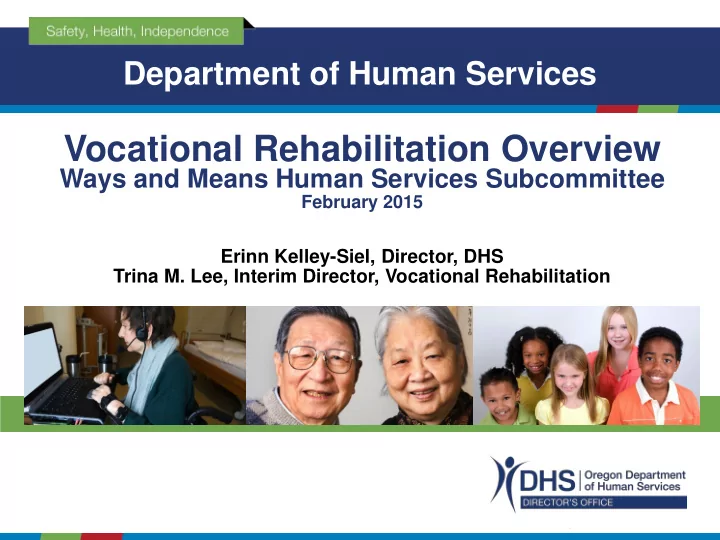

Department of Human Services Vocational Rehabilitation Overview Ways and Means Human Services Subcommittee February 2015 Erinn Kelley-Siel, Director, DHS Trina M. Lee, Interim Director, Vocational Rehabilitation
Mission statement Assist Oregonians with disabilities to achieve and maintain employment and independence 2
Types of consumer services 3
Meet Nick… Excited to learn job skills through VR’s collaboration with employers • On-the-job training in welding • Provided with occupational tools and clothing • Placed into permanent employment at Ochoco Manufacturing, a company producing water trucks
Meet Icela… Realizes her vocational dream with the help of VR • Accommodating her learning disabilities • Completing her Practical Dental Assisting Program • Placed into permanent employment at Hood River Dental Office
Meet Myron… Determination leads to his own contracting business using VR’s Self-Employment Plan • Stamina and medical issues from a head injury • Prior work history as a plumber • Wanting a job he could physically tolerate rather than at home living on Social Security Disability Benefits • Assisted in obtaining a contractor’s license • Provided with classes for microbusinesses • Able to work at his own pace to maximize physical capacities
Oregonians served 7
Why Vocational Rehabilitation matters • 214,393 working-age Oregonians experience a disability • Only 34% of individuals with disabilities work vs. 72% of individuals without disabilities (US Census) • $18,408 is the median wage for an individual with a disability; median wage for non-disabled individuals is $27,701 • 9,310 youth exited special education last year 8
VR Consumer demographics: Disabilities 9
VR Consumer demographics: Cognitive impairments 10
VR Consumer demographics: Gender and age 11
VR Consumer demographics: Race/Ethnicity 12
Services Vocational Rehabilitation provides services to: • Consumers • Employers • Providers 2,156 Oregonians went to work in SFY 14 because of Vocational Rehabilitation services 13
The four stages of the VR process 14
VR Caseload along the Service Continuum 15
Centers for Independent Living (CIL) 16
CIL program performance 17
VR “Basic Services” Serves: • Individuals with disabilities to find, enter and maintain employment Provides: • Intensive counseling • Intervention and support services • Assistive technology 18
Youth Transition Program Serves: • High school youth with disabilities Provides: • Preparation for employment or career- related, post-secondary education • A new pattern of service within schools and communities 19
Supported employment Serves: • Individuals with the most significant disabilities who can obtain competitive employment in the community with intensive training and job coaching • Individuals who need on-going support to retain employment VR and contracted services, including: • Job placement and job coaching at the worksite • Follow-along services that support the individual and maintain employment are provided by other local human services and workforce partners 20
VR Services for Providers Training, sharing information and support • 20 Enhancing Employment Outcomes Trainings • Employment webinars • Annual Vocational Rehabilitation In-Service • Benefits and work incentives training Diversity, inclusion consultation and support • Disability awareness training • Americans with Disabilities Act • 503 compliance support 21
VR Services for Employers • Employer engagement activities • Live resume • Meet business • Tapping Fresh Talent Job Fair • Options Conference • Workforce training and supports • Diversity and inclusion consultation and support • Disability awareness • Americans with Disabilities Act • 503 compliance support • Accommodation assessment and support 22
What we’ve done Increased employment outcomes for clients Decreased in cost per outcome • Performance-based job • Performance Audit development contracts – Comprehensive policy manual revision completed – Required agency-provided job development training – Enhanced use of performance data – Established minimum qualifications – Reduction in cost per case – Shifted from fee-for-service – Increased feedback to to benchmark payments counselors – Fixed fees for job preparation 23
Employment outcomes 24
What’s next • Employment First - services for individuals with intellectual and developmental disabilities • Workforce Investment and Opportunity Act (WIOA) changes • Leverage and align partnership opportunities • Continue efforts to improve efficiency and financial sustainability 25
WIOA priorities for VR agencies
WIOA impacts to Oregon VR
VR Budget: $97.17 Million Total Funds 28
Budget: 96% in Direct Payment and Service Delivery 29
Budget: By Fund Type – 76.3% Federal Funds 30
Vocational Rehabilitation summary Mission: Assist Oregonians with disabilities to achieve and maintain employment and independence • Part of the State’s workforce system that meets the needs of a complex population • Builds on and extends upon the work of other state programs in and out of DHS • Leverages resources • Creates innovative programs that can serve as models for other programs 31
Wrap-up DHS 2015-17 Coming Up Next: Budget Themes: • Public Testimony • Finish what we’ve - February 19 started • Oregon Commission for the • Impact of federal Blind changes - February 24 • Outcomes & prioritization • Self Sufficiency Program Overview • Upstream investments - February 25 & long term financial sustainability • Child Welfare Overview - February 26 • Partnership alignment 32
Department of Human Services www.oregon.gov/dhs Safety, Health and Independence for all Oregonians 33
Recommend
More recommend